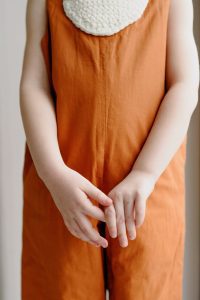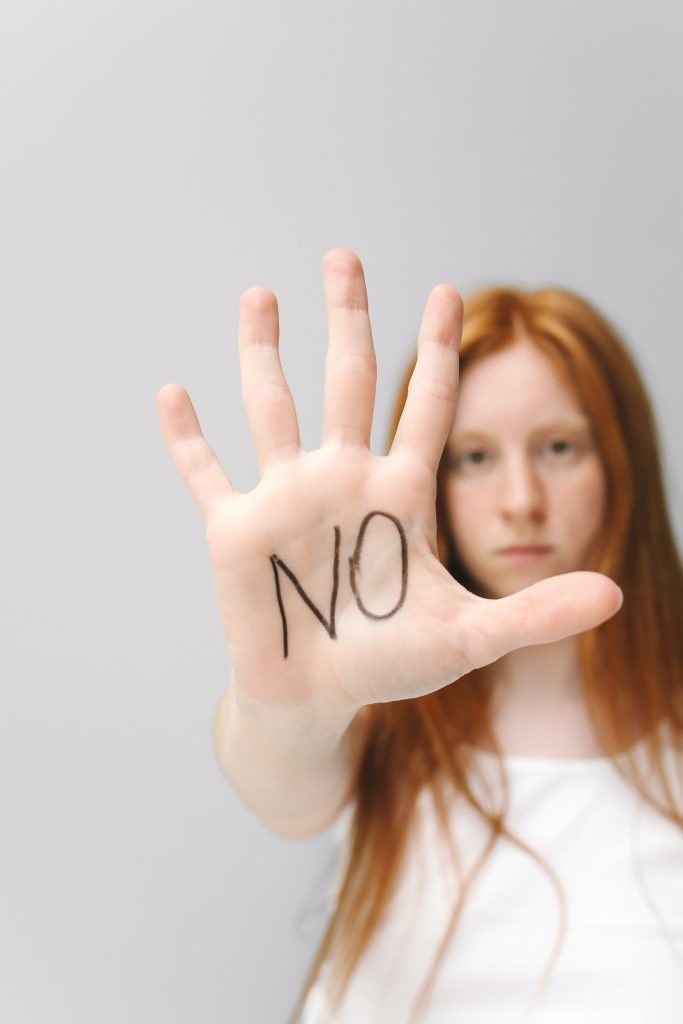I grew up in a very large, very affectionate, very southern family. I’m talking at least thirty grandchildren–just on one side–large. While holidays were always beautiful flurries of wrapping paper, hot chocolate, and babies everywhere, there was always one moment of the day I dreaded the most: saying goodbye.
No, not for the reasons you’re probably thinking. Saying goodbye was the worst part of a family gathering not because I didn’t want the magic to end (although that definitely didn’t help), but because it meant I had to tell every. single. person. goodbye. A wave was not acceptable, either. I had to go to each and every one of my aunts, uncles, cousins, and grandparents and give them a hug and/or a kiss before I was allowed to head to the car.
There was no escaping this part of the day; it was expected and required. It was not limited to holidays; any family gathering, whether it be some of us or all of us, ended with what I refer to as the “goodbye ritual.” As a small child, I don’t think I minded it as much, and in part, I think that had to do with my rank inside the family: I am the oldest of my generation of cousins. I didn’t have twenty-something cousins to say goodbye to at the time, and most of my aunts and uncles were young and unmarried. While still a large number of people to tend to, it was more manageable than what it is now, and I thought it was totally normal; I didn’t know any differently.
As I got older, our family grew even larger, and I gained more independence and more opinions of my own. I figured out the reason I had a knot in my stomach every time we headed to family functions was because of the inevitable, required “goodbye.” Everyone wore different colognes/perfumes, everyone had different laundry detergent on their clothes, and some people squeezed too hard while others clearly hated the “goodbye ritual” as much as I did. Some family members used this brief interaction as the time to tease me about something embarrassing, whisper something loudly into my ear, or to make a comment about my body/appearance. I absolutely dreaded these moments. It took away the magic of the day, and I nearly always left with hurt feelings, a headache, or both.

If I ever tried to exit early to avoid the situation, I would catch an earful about how I was disrespectful, or how I hurt one of my older family member’s feelings by skipping over them before I left. It was never my intention to upset someone; I just simply preferred to not be touched by several people in a short span of time. I found this incredibly overwhelming, but my feelings about the situation never seemed to matter. Waving from across the room was not accepted. When I expressed my anxiety over the “goodbye,” I was met with angry whispers of it’s just a hug. Go over there now. Or, you are an example to your siblings. They do whatever you do. Remember that. And, don’t be rude. You’re going to hurt X’s feelings. They’re going to think you have a problem with them–you don’t have a problem with them, do you? No? Then go do it.
*Unsubscribe
Now as a mother of my own children, I do not subscribe to the same family culture as I was raised in. However, it wasn’t always this way. At the beginning of my motherhood journey, I very much told my toddlers to go tell their aunts and uncles, and grandparents goodbye before we left a family gathering, just the same as I was told. I would even carry my children to each family member for a kiss and a hug, because that’s what I knew, and my babies had no opinion of their own yet regarding the “goodbye ritual.”
But one day, my oldest did have an opinion on the matter, and a very LOUD one at that: don’t touch me. She was only about eighteen-months-old at the time, but her screams and refusal to be held by anyone but me while heading out the door made her message very clear. While her aunts and uncles usually didn’t pressure her to say goodbye with hugs and/or kisses, her grandparents were a different story.
My daughter loves her grandparents–her refusal to give physical affection when saying goodbye had nothing to do with her affinity for them. In fact, upon arriving to a family function, she would happily and freely give everyone a hug. But for whatever reason (I suspect overstimulation, exhaustion, or independence), she was not a fan of giving physical affection when it came time to say goodbye. And honestly, the reason doesn’t matter. But it took me a while to get to that conclusion, so let me back up a bit.
For the first three to four years of my oldest child’s life, I would encourage and even pressure my daughter to partake in the old “goodbye ritual.” I would repeat the same phrases that were said to me: it’s just a hug. Come on, don’t be rude. You’re gonna hurt their feelings. I would carry her on my hip to my mom, and tell her to say goodbye, to give her grandma a kiss, etc. and she would turn her head away and shake her head “no.” I would repeat myself, and again, she would say “no,” but now louder and firmer, and her body would clearly be pulling away from her grandparent’s direction. At that point, my mom would pry my daughter out of my arms, causing her to scream bloody murder and cry for me, and all the while, my mom would smother her in kisses and tickle her as if my daughter was a willing participant.
Then, she would pass my daughter (still screaming and crying) over to my dad or to another family member, and she would be hugged and/or kissed or tickled repeatedly until she reached a family member who didn’t want to make her upset and would return her to me. I would watch this, and allow this, because I was raised with this behavior. But as my daughter got older, she was too big to be passed around, as she made very clear one day when my mom tried to scoop her up against her will and my daughter kicked and screamed until her grandmother put her back down. As she was screaming, I told my mom repeatedly, “just put her down. She’ll stop crying if you just put her down. She doesn’t want to be held.” My dad witnessed this event, and proceeded to angrily tell me my daughter had a “very extreme reaction” that “wasn’t normal” and I needed to “get that under control.” He proceeded to check on my mom, comforting her while ignoring my crying daughter on the floor.
I felt my face go hot and red, and I choked back tears. I was embarrassed, but mostly, I was pissed that my daughter, my THREE-YEAR-OLD, was labeled the problem. Not any of the adults in the room: just the toddler.
This was the beginning of my wake-up call.
Goodbye, Ritual
The next week, we were due to see my parents. I explained to my daughter she didn’t need to give anyone, even her grandparents, any hugs or kisses if she didn’t want to. She could kindly wave and blow kisses, fist-bump, whatever her little heart and body were comfortable with. She could tell them, “no kisses or hugs, please.” Unexpectedly, she threw her arms around me and said, “thank you, Momma.” And when it was time to leave my parents’ house, she did exactly that: waved and blew kisses excessively, happily and loudly exclaiming, “I love you! Thank you for dinner! See you soon!” She was beaming, on her tippy-toes, her babydoll and cup in her other hand, ready to walk out the door. I was so proud of her.
Until her grandmother decided that wasn’t acceptable. She ran to my daughter, her hands outstretched, saying “I’m going to get you! I’m coming to get my kisses! I’m going to get you!” And just like that, my daughter ran for it, hiding behind furniture and repeatedly screaming “NO! STOP!” My mom pulled her out from behind a chair and began to kiss and tickle her, despite my daughter pushing away her hands, arching her back, and crying. At this point, I say, “Mom, she doesn’t like it. Please put her down. She’s crying!” To which she responded, “She’s smiling and laughing! She’s fine!” I pointed out that the only reason my daughter was laughing was because that is the natural human response to being tickled, but it didn’t matter. My mom continued, saying, “If I don’t do this, she’s going to think I don’t love her!”
I froze. I didn’t know what to do, or what to say. I knew I was angry, and I knew I hated this. But they weren’t listening to me, or to my daughter. Both of us, both of our feelings, both of our personal spaces didn’t matter to the people we both loved. I was hurt, she was hurt, and I was furious with myself for not standing up for my daughter more firmly.
But I was continually told we were the issue, not them. And due to severe family dysfunction and personal trauma that I will save for another blog post, another day, I questioned myself. What was the big deal about giving your grandmother a hug? Why is my daughter making such a problem out of this? Why can’t she just give us a quick hug and we can all move on? In a moment of frustration and doubt, I went against my instinct and tried to convince my daughter to violate her own boundaries. I told her, “You’re hurting your grandma’s feelings. How would you feel if you wanted a hug and she told you no?” To which she replied, “Sad.” I said, “Right. Do you want her to feel sad? You’re hurting my mom’s feelings. Could you please just give her a little hug before we leave?” My daughter told me she would try, but she was clearly very uncomfortable and was only trying to make me, her own mom, happy.
R-E-S-P-E-C-T
I hated myself for that conversation for weeks. I realized everything I taught her at home was in direct conflict with this “goodbye ritual” situation. I never allowed her to force herself onto her little sisters, often telling her, “they said no. Please respect their no.” I didn’t allow anyone to force themselves on her, even her father and I. Why was I allowing my parents to do this to her? Why was I pressuring her to do this for the sake of their feelings? Eventually, I apologized to my daughter and told her I had been wrong for asking her to do those things. I told her she was right to say “no” when she didn’t want to be touched, no matter how much we love the person asking for affection. I think it is pretty obvious why it was so important for me to apologize and reinforce her boundaries: to protect her bodily autonomy and to reinforce she deserves respect.
If my daughter can’t practice setting boundaries and standing up for herself inside of her own family, then how will she ever learn that she matters? How will she ever learn that she is worthy of protection, worthy of respect? How will she ever learn that her body is entirely her own?
After several more interactions with my parents, and several more attempts to talk to them and explain why they needed to stop forcing physical affection upon my daughter, I had reached my limit. It seemed no reason was good enough, no rationale made any sense to them, and clearly something had to be wrong with my daughter. I made an appointment with my therapist to discuss what to do next, as I was terrified to hurt my parents’ feelings, yet determined that my daughter would not grow up in the same environment I did.

My therapist shocked me. After I explained everything, she very bluntly said, “this is unacceptable. There is no excuse for this behavior. Put an end to it.” I asked her, “how do I do that without my parents getting mad at me? I’m sick just thinking about having to confront them again.” She said, “is this about protecting your parents’ feelings? Or is this about protecting your daughter?” I replied the latter. She said, “right. So you tell them, ‘if you continue to ignore my daughter’s boundaries, I will no longer bring her over to visit’ and let the chips fall where they may. You stick to your word. Their feelings are irrelevant.”
Their feelings are irrelevant. WHAT?! I had been taught my entire life–specifically through this toxic “goodbye ritual”–that all that EVER mattered were other people’s feelings.
And now, a licensed mental health professional was telling me otherwise. The confusion and the freedom that came with this knowledge was overwhelming for me. My therapist even told me, “you can tell your parents this comes straight from me. Blame it on me; I don’t care. But this has got to stop.”
I didn’t blame it on her, but I did use my therapist’s advice as leverage when I approached my mom. I was shaking, but I told her, “Mom, I really can’t let you keep forcing hugs and kisses on my daughter. I’m teaching her to protect herself and to have boundaries. Every time you do that, you’re teaching her the opposite. My therapist even says this isn’t okay and needs to stop. I won’t keep bringing her over to visit you if this continues.” She was reluctant and attempted to debate with me on the reasoning, but I did not engage, and she eventually dropped it.
Now, nearly an entire year later at age five, my daughter is very good at respectfully and kindly stating her boundaries, especially with family members. My parents no longer force physical affection with any of my children, but they do occasionally pull the sad face and the “you’re hurting my feelings” card. But, I just remind my daughter: grown-up feelings are not your problem. You are not responsible for an adult’s emotions or reactions. And you don’t owe anyone anything.
And now that her boundaries are respected by virtually everyone in the family, my daughter is far more affectionate than she has ever been. Do you know why? Because when an adult respects a child’s boundaries, that child feels safe. Go figure.
















